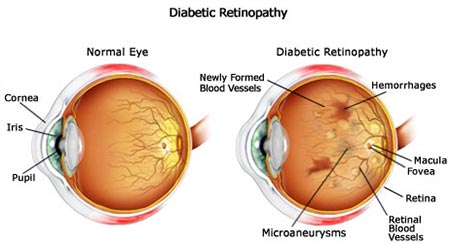Diabetes can affect sight by causing cataracts, glaucoma, and most importantly, damage to blood vessels inside the eye, a condition known as “diabetic retinopathy”. Diabetic retinopathy is a complication of diabetes that is caused by changes in the blood vessels of the retina. When blood vessels in the retina are damaged they may leak blood and grow fragile, brush-like branches and scar tissue. This can blur or distort the vision. Diabetic eye disease is a leading cause of blindness worldwide. People with untreated diabetes are said to be 25 times more at risk for blindness than the general population. The longer a person has had diabetes, the higher the risk of developing diabetic retinopathy.

Diabetic Retinopathy may be developing even when your sight is good. This disease can progress to the most advanced stages without any noticeable change in vision.
Fortunately, with regular proper eye care and treatment, the incidence of severe vision loss has been greatly reduced. Laser surgery is often helpful in treating diabetic retinopathy. Laser surgery may be performed in an out-patient clinic and can greatly reduce the chances of severe visual impairment. Intraocular Steroid Injection is a newly emerging treatment for diabetic macular edema. This therapy helps reduce the amount of fluid leaking into the retina, resulting in visual improvement. Advanced cases of retinopathy require vitreous surgery to restore vision.
Along with eye care, controlling blood pressure, maintaining normal cholesterol levels, and treating anemia can also prevent or significantly reduce the progression of diabetic retinopathy.
Diabetic retinopathy is far easier to treat and has fewer complications when caught early. Our diabetic retinopathy specialists conduct a comprehensive eye examination to detect and access the severity of diabetic retinopathy through extensive tests like Fundus Fluorescein Angiography (FFA) and Optical Coherence Tomography (OCT), etc.
The treatment is based on factors like stage of the disease, age of the patient, and recommendations of the retina specialist.
Of course, maintaining a healthy diet and exercising regularly will help prevent and fight off the effects of diabetic retinopathy, but there is no sure-fire fix. Surgery may help with serious cases of diabetic retinopathy. Laser treatment has proven to be very effective at sealing leaking blood vessels, but the success of this surgery can vary depending on how long the leak has been there. Laser surgery may be performed in an out-patient clinic and can greatly reduce the chances of severe visual impairment. Intraocular Steroid Injection is a newly emerging treatment for diabetic macular edema. This therapy helps reduce the amount of fluid leaking into the retina, resulting in visual improvement. Advanced cases of retinopathy require vitreous surgery to restore vision.
Along with eye care, controlling blood pressure, maintaining normal cholesterol levels, and treating anemia can also prevent or significantly reduce the progression of diabetic retinopathy.

UmaPrem Netralay is the best eye care hospital in Uttar Pradesh. They have a good environment for every patient. It is established by Dr. Arun Kumar Gupta. Dr. Arun Kumar Gupta is an experienced Ophthalmologist and also a gold Medalist.
©2023 UMAPREM NETRALAY. All Rights Reserved. Design and developed by E-Data Web Center & Raj Tech.